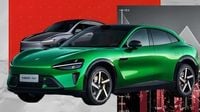In a dynamic and fiercely competitive Chinese electric vehicle (EV) market, Tesla’s recent sales figures in China show a subtle rebound, yet the company faces mounting pressure from emerging domestic rivals, notably Xiaomi, whose new electric SUV, the YU7, has taken the market by storm.
According to data released on July 2, 2025, by the China Passenger Car Association (CPCA), Tesla China sold 71,599 vehicles in June 2025, including both domestic sales and exports. This figure marks a 0.83 percent increase compared to the 71,007 vehicles sold in June 2024 and a significant 16.12 percent rise from May 2025’s 61,662 units. This uptick breaks Tesla’s streak of eight consecutive months of year-on-year sales declines in China, which had persisted from October 2024 through May 2025.
Despite this slight monthly recovery, Tesla’s second-quarter sales in China tell a more cautious story. The company sold 191,720 vehicles in the April-June period, representing a 6.82 percent decline year-on-year and marking the third consecutive quarter of year-on-year sales decreases. For the first half of 2025, Tesla’s China sales, including exports, totaled 364,474 vehicles—a 14.57 percent drop from the 426,623 units sold during the same period in 2024.
The competitive landscape in China’s EV market is intensifying, with Xiaomi emerging as a formidable contender. On June 26, 2025, Xiaomi launched its YU7 electric SUV, positioned directly against Tesla’s popular Model Y. The YU7 is larger and more affordable than the Model Y, a strategic advantage that has resonated strongly with Chinese consumers. Within just three minutes of opening online reservations at 10:00 p.m. Beijing time on July 1, Xiaomi secured 200,000 firm orders for the YU7, escalating to over 240,000 locked-in orders within 18 hours. The vehicle is essentially sold out until 2027, a testament to its overwhelming popularity.
The author of a detailed review who test-drove the YU7 praised its performance and design, noting the crossover’s 680 horsepower from Xiaomi’s in-house developed V6 electric motors and its sophisticated chassis and suspension system featuring active pitch correction via air suspension. Priced at roughly $47,000, the YU7 offers a premium driving experience that rivals luxury brands. The interior boasts features such as double laminated glass for a quiet cabin and zero-gravity seats, elevating it above Xiaomi’s earlier SU7 sedan and even challenging Tesla’s Model Y in terms of luxury and build quality.
Software-wise, Xiaomi integrates its automotive offerings with its renowned smartphone ecosystem. The YU7’s infotainment system supports multitasking, including simultaneous use of Apple Music and wireless Apple CarPlay, a rarity in Chinese vehicles. Xiaomi has also designed the car to accommodate various accessories, enhancing user customization.
Looking ahead, Xiaomi plans to begin exporting its vehicles outside China starting in 2027, though it has not yet confirmed which models will be offered internationally. This move could further disrupt global EV markets, especially if Xiaomi’s competitive pricing and product quality translate well overseas.
Meanwhile, Tesla’s market share in China faces challenges beyond Xiaomi’s rise. The company recently raised the price of its Model 3 long-range all-wheel drive by 10,000 yuan (around $1,400), perhaps in response to market pressures. Tesla’s Model Y sales in China have relied heavily on incentives such as 0% financing and attractive trade-in appraisals to maintain their position. However, industry analysts estimate Tesla’s Q2 2025 sales in China dropped by approximately 12 percent year-on-year, pressured by the launch of new models from domestic competitors.
Other Chinese EV manufacturers are also making strides. Xpeng reported delivering 34,611 vehicles in June 2025, marking its eighth consecutive month of over 30,000 deliveries. Li Auto delivered 36,279 vehicles in June, though this was an 11.2 percent decrease from May. The company’s second-quarter deliveries totaled 111,074 units, surpassing its lowered guidance of 108,000 cars despite cutting its outlook by more than 15,000 vehicles in late June. Notably, Li Auto has recently prohibited extra rebates within its sales network, aiming to reduce internal competition and focus on brand strength and service quality.
Meanwhile, Geely-backed Zeekr experienced a decline in June deliveries, reporting 16,702 cars sold, down 11.7 percent from May and 16.9 percent year-on-year. Nio, another premium brand, saw a slight increase in deliveries to 24,925 units in June, buoyed by growth in both its premium and more affordable sub-brands.
Chinese EV giant BYD continues to dominate the market, with passenger car sales rising to 377,628 vehicles in June 2025, over half of which were battery-only electric cars. BYD’s total passenger car sales for the first half of the year reached a staggering 2.1 million vehicles, far outpacing competitors. Leapmotor and Aito also reported strong June deliveries, with 48,006 and 44,685 cars sold respectively, supported by partnerships with international firms and advanced technology integration.
Industry experts predict that amidst this fierce competition and ongoing price wars, only a few major players—BYD, Xiaomi, and Geely—are likely to survive the expected consolidation in China’s EV market. Brands like Nio, despite their innovative products, face financial challenges that could jeopardize their future.
The rise of Xiaomi’s YU7, in particular, symbolizes a shift in China’s EV market dynamics. Its rapid sales success and premium yet affordable product offering have unsettled established players like Tesla. As one analyst put it, “If Tesla thinks that China will continue to buy its Model Y at the same rate, then they are delusional.”
With Xiaomi’s strong brand loyalty, vertical integration, and aggressive pricing, the company has not only captured the imagination of Chinese consumers but also set a new benchmark for what an electric vehicle can offer in terms of technology, performance, and value.
As the Chinese EV market evolves rapidly, Tesla’s slight sales recovery in June may be a temporary reprieve rather than a sign of sustained growth. The company’s ability to innovate and compete effectively against nimble domestic manufacturers like Xiaomi will be crucial in maintaining its foothold in the world’s largest EV market.




